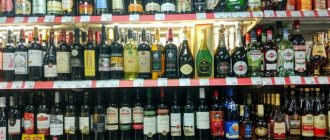As is known, when carrying out the retail sale of alcoholic beverages, including within the framework of the provision of public catering services, it is necessary to take into account the prohibitions and restrictions established by the Federal Law of November 22, 1995 No. 171-FZ “On state regulation of the production and circulation of ethyl alcohol, alcoholic and alcohol-containing products and on limiting the consumption (drinking) of alcoholic products.” We wrote about them in the articles “Forbidden alcohol when providing catering services” (No. 7, 2015), “Special requirements for a stationary retail facility when selling alcohol” (No. 8, 2015). At the same time, in addition to the prohibitions and restrictions provided directly at the federal level, government bodies of the constituent entities of the Russian Federation are vested with the right to establish additional restrictions regarding the retail sale of alcohol. Let's find out whether regional authorities have the right to introduce any restrictions and prohibitions and whether they can affect persons selling alcoholic products when providing catering services.
The norm that gives the regional authorities a free hand literally reads like this (this is paragraph 2, paragraph 5, article 16 of Federal Law No. 171-FZ).
State authorities of the constituent entities of the Russian Federation have the right to establish additional restrictions on the time, conditions and places of retail sale of alcoholic products, including a complete ban on the retail sale of alcoholic products.
Restrictions on the sale of alcohol to consumers
Strict requirements relevant for 2021 apply not only to alcoholic products, but also to the place of sale, as well as to the seller himself.
Any alcohol-containing product must be accompanied by the following information available to the consumer:
- Product Name.
- Price.
- Name of the country where the product was produced.
- Alcohol certification information.
- Information about state standards to which the products comply.
- Volume.
- Compound.
- Content of harmful substances and their volume.
- Alcohol content percentage.
- Information about the dangers of alcohol.
Also in the Russian Federation there is a ban on the sale of alcohol-containing products in the following places:
- On the territory of educational, medical or cultural institutions (regardless of the form of ownership).
- In sports facilities.
- In wholesale and retail markets.
- In all types of public transport, as well as train stations, bus stops, airports and gas stations.
- In places where military units are stationed.
- In places that are close to sources of increased danger.
- In crowded places.
- In retail outlets that are not stationary.
Prohibitions on the sale of alcohol-containing products include:
- Prohibition on the sale of alcohol to persons under 18 years of age.
- Trading without the appropriate license.
- Remote trading.
- A ban on the sale of alcohol without an up-to-date list of products.
- In plastic containers with a volume of more than 1.5 liters.
Do you think it is necessary to continue to limit the hours for the sale of alcohol?
Yes, this allows you to reduce the amount of alcohol consumed Yes, especially on weekends and holidays No, the ban does not make sense, since people buy alcohol in advance
Alcohol sales hours in Russia
The time for the sale of alcohol in the Russian Federation is limited at the legislative level. At the federal level, the ban is set for the period from 23:00 to 8:00 the next day. Thus, the ban applies to night time.
At the same time, local legislative bodies have the right to establish other time frames for the ban on the sale of alcohol-containing products. Local regulations may exercise the right to change the time frame for the sale of alcohol only upward. It is impossible to reduce the gap established at the federal level.
Table of time restrictions relevant for 2021
| Name of the region of the Russian Federation | Prohibition time for the sale of alcohol during normal hours (weekends and holidays) | |
| Beginning of period | End of period | |
| Moscow | 23:00 | 8:00 |
| Moscow region | 23:00 | 8:00 |
| Saint Petersburg | 22:00 | 11:00 |
| Republic of Adygea | 22:00 | 11:00 |
| Karachay-Cherkess Republic | 21:00 | 11:00 |
| Ivanovo region | 21:00 | 9:00 |
| The Republic of Dagestan | 20:00 | 10:00 |
| Nenets Autonomous Okrug | 20:00 | 11:00 |
| Chukotka Autonomous Okrug | 20:00 | 11:00 |
| Tambov Region | 21:00 | 8:00 |
| Tyumen region | 21:00 | 8:00 |
| Vladimir region | 21:00 | 9:00 |
| Irkutsk region | 21:00 | 9:00 |
| Novgorod region | 21:00 | 10:00 |
| Lipetsk region | 21:00 | 9:00 |
| Kirov region | 21:00 (23:00) | 9:00 (8:00) |
| Amur region | 21:00 | 11:00 |
| Pskov region | 21:00 | 11:00 |
| Jewish Autonomous Region | 22:00 | 11:00 |
| Krasnodar region | 22:00 | 11:00 |
| Komi | 22:00 | 8:00 |
| Ryazan Oblast | 22:00 | 8:00 |
| Sakhalin region | 22:00 | 8:00 |
| Sevastopol | 22:00 | 8:00 |
| Bryansk region | 22:00 | 8:00 |
| Arhangelsk region | 22:00 | 8:00 |
| Saratov region | 22:00 | 10:00 |
| Astrakhan region | 21:00 | 10:00 |
| KHMAO-Yugra | 20:00 | 9:00 |
| Primorsky Krai | 22:00 | 9:00 |
| Leningrad region | 22:00 | 9:00 |
| Nizhny Novgorod Region | 22:00 | 9:00 |
| Altai region | 23:00 | 10:00 |
| Republic of Crimea | 23:00 | 10:00 |
| Murmansk region | 21:00 | 11:00 |
| Kaliningrad region | 22:00 | 10:00 |
| Kaluga region | 22:00 | 10:00 |
| Tomsk region | 22:00 | 10:00 |
| Tver region | 22:00 | 10:00 |
| Udmurtia | 22:00 | 10:00 |
| Magadan Region | 22:00 | 10:00 |
| Chuvash Republic | 22:00 | 10:00 |
In Bashkiria, Karelia, Transbaikalia and other regions of the Russian Federation, alcohol is sold in accordance with federal requirements - from 8:00 to 23:00.
Ban on the sale of certain types of alcohol
For example, such a prohibition is contained in the Law of the Republic of Mordovia No. 18-Z.
On the territory of the Republic of Mordovia, the retail sale of low-alcohol tonic drinks, namely alcoholic products containing ethyl alcohol from 1.2 to 9% of the volume of the finished product and at the same time caffeine or other tonic substances in an amount of at least 15.1 mg per 100 ml of these products is prohibited ( Clause 3, Article 7). A similar norm was included in the Law of the Bryansk Region dated 02/29/2012 No. 8-Z “On the regulation of certain issues in the field of retail sale of alcoholic beverages in the Bryansk Region” (clause 2 of Article 6.2) by the Law of the Bryansk Region dated 02/05/2015 No. 1 -Z. However, the judges considered that the ban on the retail sale of one type of alcoholic beverages throughout the Bryansk region was introduced unlawfully (Clause 5, Article 16 of Federal Law No. 171-FZ does not provide such a right to a constituent entity of the Russian Federation) (Appeal ruling of the RF Supreme Court dated September 16, 2015 No. 83-APG15-6). As a result, the Law of the Bryansk Region dated December 28, 2015 No. 140-Z, clause 2, art. 6.2 of the Law of the Bryansk Region No. 8-Z was declared invalid.
Federal Law No. 171-FZ gives legislative (representative) (non-executive) government bodies of constituent entities of the Russian Federation (not local governments) the right to introduce additional restrictions on the time, conditions and places of retail sale of alcoholic beverages, including when providing public catering services. In this regard, regional authorities may increase the period of time established by this law (from 23.00 to 8.00), when retail sale of alcohol is unacceptable (for example, from 20.00 to 11.00). This additional restriction may not apply to persons providing catering services (as under federal law), or only to some of them (for example, to catering establishments classified as a “restaurant”, or subject to ensuring that alcohol is not taken away). Another possible additional restriction on alcohol that constituent entities of the Russian Federation can introduce for catering establishments is a certain number of tables and seats in the service hall. At the same time, at the regional level, a ban on the retail sale of alcohol to persons under 21 years of age or a certain type of alcoholic product cannot be established. [1] Approved and put into effect on January 1, 2009 by Order of Rostekhregulirovanie dated December 27, 2007 No. 475-st. Lost force on January 1, 2016 due to the publication of Rosstandart Order No. 1676-st dated November 22, 2013.
[2] Title of the law: “On certain issues of the implementation of the Federal Law “On state regulation of the production and turnover of ethyl alcohol, alcoholic and alcohol-containing products and on limiting the consumption (drinking) of alcoholic products” in the Trans-Baikal Territory."
Unlock access to the private part of Clerk with a Premium subscription. Get hundreds of webinars and online courses, unlimited consultations and other proprietary content for accountants.
Hurry up to subscribe with a 20% discount until October 15, 2021. Read more about “Premium” here.
Peculiarities of alcohol sales during holidays, including New Year's
Also at the legislative level there is a ban on the sale of alcohol or other restrictions on certain holidays.
| Name of the holiday | Restrictions |
| Knowledge Day (September 1) | A complete ban on the sale of alcohol-containing products in some regions, including Moscow, St. Petersburg, Volgograd region, etc. |
| Children's Day (June 1) | Complete ban on the sale of alcoholic beverages |
| Student's Day (November 17) | Most regions of the Russian Federation have introduced a ban on the sale of alcohol on this day |
| Youth Day | A ban on the sale of alcohol-containing products has been introduced in 28 regions of the Russian Federation |
| Last call (May 25) | Prohibition on the sale of alcohol |
| May 1 and 9 | In a number of regions, a complete ban on the sale of alcoholic beverages has been introduced due to large-scale events. |
| Day of the city | In most regions it is also a day on which the sale of alcohol is prohibited |
Also in some regions of the Russian Federation there is a ban on the sale of alcohol-containing products on Russia Day, Day of Sobriety, Day of National Unity, as well as on July 8 - the Day of Family, Love and Fidelity.
There are also local restrictions, in particular, in St. Petersburg it is prohibited to sell alcohol on the alumni holiday - Scarlet Sails, which traditionally takes place on June 20.
Sale of alcoholic beverages to minors
Read
Liability for driving while intoxicated
More details
What are the penalties for drinking alcohol in a public place?
Look
The addition must be introduced by the relevant authority
As the Plenum of the Supreme Arbitration Court explained in paragraph 12 of Resolution No. 47 dated July 11, 2014, relevant acts on the introduction of additional restrictions on alcohol can only be adopted by legislative (representative) bodies of state power of the constituent entities of the Russian Federation, since this establishes restrictions on civil rights in the sphere of economic turnover. The FAS, in turn, added that additional “alcohol” restrictions are often introduced by local governments, which does not comply with current legislation (Letter No. AK/55277/14 dated December 31, 2014). In this regard, restrictions imposed by the wrong body are not taken into account by judges. Let's give examples.
÷>
The establishment of additional restrictions on the time of retail sale of alcoholic beverages by Decree of the Government of the Republic of Tyva dated February 21, 2012 No. 96, which is an executive body of state power, does not comply with the provisions of federal legislation. The arguments of the applicant of the cassation appeal about the delegation to the Government of the Republic of Tyva of powers regarding limiting the time for the sale of alcoholic products cannot be taken into account, since they contradict the explanations contained in paragraph 12 of the Resolution of the Plenum of the Supreme Arbitration Court of the Russian Federation No. 47 (Resolution of the Supreme Arbitration Court of the Russian Federation dated June 22, 2015 No. F02-2621/2015 in case No. A69-3106/2014).
The establishment of an additional time limit for the retail sale of alcoholic beverages by the Decree of the President of the Republic of Sakha (Yakutia), that is, a by-law normative legal act, contradicts the provisions of federal legislation (FAS VSO Resolution of July 29, 2014 No. F02-2465/2014 in case No. A58-7168/2013) .
Who can sell alcohol
In accordance with Federal Law No. 171, only those companies that have received the appropriate license can sell alcohol.
There are additional requirements for applicants:
- they must own suitable premises for the storage and sale of these products;
- have a cash register.
The right to issue licenses for the sale of alcohol belongs to the Federal Service for Regulation of the Alcohol Market.
Liability for trade violations
If violations related to the sale of alcoholic beverages are detected, the culprit may be subject to liability measures enshrined in the legislation of the Russian Federation. The competent supervisory authorities in this case are:
- Federal Tax Service of the Russian Federation;
- Rospotrebnadzor;
- law enforcement agencies.
Fraud of legal entities and entrepreneurs
Read
Illegal business activity
More details
How to fight illegal business
Look
At the wrong time
Violation of the ban on the sale of alcoholic beverages at night, as well as on holidays, entails an administrative penalty in the form of a fine in accordance with Article 14.16 of the Code of Administrative Offences.
The amount of the fine ranges from 20,000 to 40,000 rubles for officials, and from 100,000 to 300,000 rubles for legal entities.
Punishment may also include confiscation of alcoholic beverages.
Minors
Responsibility for selling alcoholic products to a person under 18 years of age can be imposed on both the seller and the legal entity. However, the head of the retail outlet and the legal entity can avoid penalties if they can prove that the fault lies solely with the seller and that they followed all the necessary precautions.
The amount of the fine varies depending on how many times the violation was committed.
For the first violation detected, an individual, according to the provisions of the above article, will be fined in the amount of 30,000 to 50,000 rubles; official – from 100,000 to 200,000 rubles; legal – from 300,000 to 500,000 rubles.
For a repeated violation (within a year from the first) the seller is subject to criminal liability. The amount of the minimum possible fine in this case ranges from 50,000 to 80,000 rubles (in accordance with Article 151.1 of the Criminal Code of the Russian Federation).
Age limit
Clause 2 of Art.
16 of Federal Law No. 171-FZ prohibits the retail sale of alcoholic beverages to minors (that is, persons under 18 years of age - clause 1 of Article 21 of the Civil Code of the Russian Federation). Can regional authorities raise the age limit for those allowed to sell alcohol? This is exactly the norm contained in paragraphs. 1 clause 1 art. 7 of the Law of the Republic of Mordovia dated April 16, 2015 No. 18-Z “On state regulation of retail turnover of alcoholic products in the territory of the Republic of Mordovia”: in the territory of the Republic of Mordovia, retail sales of alcoholic products to persons under 21 years of age are not allowed. The Supreme Court of the Russian Federation supported the judges who decided to recognize this norm as invalid as not complying with federal law. Establishing an age limit for the buyer of alcoholic products is the prerogative of the federal legislator and does not fall within the powers of state authorities of the constituent entities of the Russian Federation. The chief arbitrator emphasized: the contested provision introduces a restriction of civil rights in the sphere of economic turnover, which contradicts paragraph. 2 p. 2 art. 1 of the Civil Code of the Russian Federation, according to which the basic principles of civil legislation and civil rights can be limited only on the basis of federal law. Currently, age restrictions to be applied in the field of retail sale of alcoholic beverages are established by federal law and can be changed, contrary to the arguments of the appeal, only on the basis of federal law (Appeal ruling of the Armed Forces of the Russian Federation dated December 9, 2015 No. 15-APG15-4).
Conclusion
Thus, the sale of alcoholic beverages on the territory of the Russian Federation is strictly regulated and must comply with a number of rules and requirements. If the prohibitions established by law for the sale of alcohol are violated, the perpetrators bear responsibility, including criminal liability.
What is the responsibility of an individual for illegal business activities?
Read
Types of liability of an individual entrepreneur under Russian legislation
More details
Who cannot engage in entrepreneurial activity
Look
Alcohol to take away is prohibited
In practice, there are also quite often situations where regional authorities prohibit organizations providing catering services from carrying out retail sales of alcoholic beverages for takeaway (not for consumption at the point of purchase).
Example - clause 4, part 2, art. 3 of the Law of the Trans-Baikal Territory of December 26, 2011 No. 616-zzk [2] (introduced by the Law of the Trans-Baikal Territory of September 25, 2014 No. 1050-zzk), according to which organizations and individual entrepreneurs, when providing catering services, are prohibited from retail sale of alcoholic beverages unless take-out is ensured alcohol from 20.00 to 11.00 local time. It is also explained here: the take-out of alcoholic beverages means its movement outside the premises to serve consumers at a catering establishment. This provision became the subject of consideration in court, which considered that there were no contradictions between it and federal legislation. In turn, the Judicial Collegium for Administrative Cases of the Supreme Court of the Russian Federation found no reason to disagree with the conclusion of the trial court. At the same time, the arguments of the appellant that the contested provisions are impossible to implement without violating the constitutional rights of third parties, that the movement of the purchased alcoholic beverages by the client can be stopped either by preventing the buyer from leaving the premises or by confiscating them, are regarded as far-fetched. No law can be considered as a means aimed at violating the constitutional rights of citizens, unless required by federal law and only to the extent necessary in order to protect the foundations of the constitutional system, morality, health, rights and legitimate interests of other persons , ensuring the country's defense and state security. On the contrary, the obligation of an organization or individual entrepreneur, established by the contested law, when providing public catering services to ensure that alcoholic beverages are not taken out during the period of prohibition of their retail sale, implies the possibility of its implementation by any measures not prohibited by law (for example, by dispensing alcoholic beverages on tap, warning buyers about the prohibition of their removal outside the premises of a catering establishment) (Determination of the Supreme Court of the Russian Federation dated June 24, 2015 No. 72-APG15-4).
Another example is the Law of the Krasnodar Territory dated 06/04/2012 No. 2497-KZ “On establishing restrictions in the field of retail sales of alcoholic beverages and non-alcoholic tonic drinks”, paragraph 4 of Art. 4.1 of which prohibits the retail sale of alcoholic beverages for takeaway (not for consumption at the place of purchase), carried out by organizations when they provide public catering services. By decision of the Krasnodar Regional Court dated July 22, 2015 No. 3-141/2015, this norm was recognized as not contradicting Federal Law No. 171-FZ, and the Supreme Court of the Russian Federation considered this conclusion to be correct (Appeal ruling dated November 18, 2015 No. 18-APG15-34). Law of the Krasnodar Territory No. 2497-KZ was adopted in order to protect the health and morality of the population of the Krasnodar Territory within the powers granted to the constituent entity of the Russian Federation, in pursuance of the requirements of Federal Law No. 171-FZ. References in the appeal to the national standard of the Russian Federation GOST R 50762‑2007 cannot be taken into account, since the provisions contained therein do not relate to the sphere of public relations, which are subject to regulation by the said federal law.










